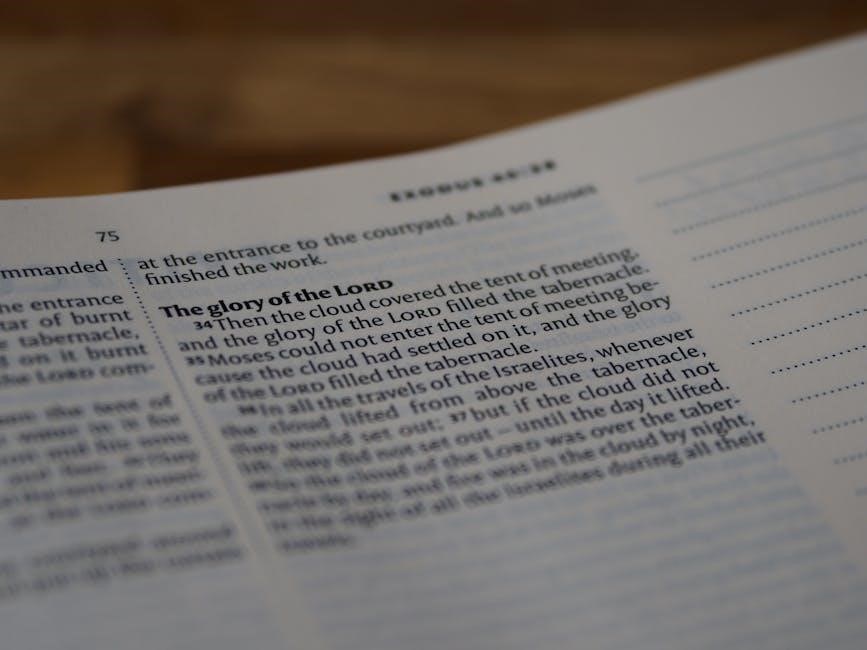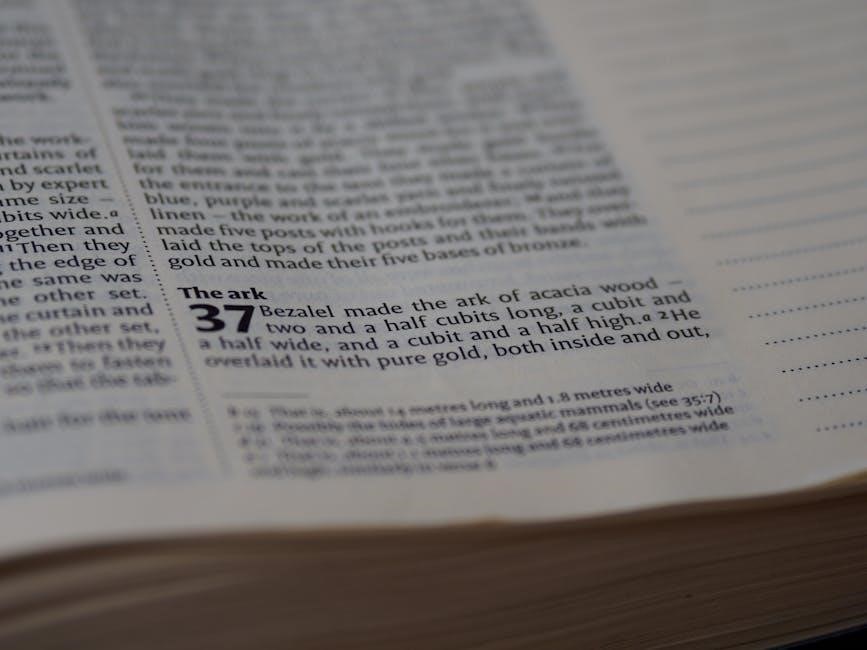The Book of Exodus narrates the Israelites’ deliverance from Egyptian bondage, led by Moses, marking their transition from slavery to a covenant relationship with God. It bridges Genesis and the wilderness journey, emphasizing divine redemption and the establishment of Israel as a holy nation. Exodus is a foundational text in Abrahamic religions, rich in theological and cultural significance.
1.1 Historical Background of the Book of Exodus
The Book of Exodus is set against the backdrop of the Israelites’ sojourn in Egypt, which began with Jacob’s family migrating during a famine. Over time, the Israelites grew in number, leading to increasing oppression under Pharaoh, who forced them into slavery. This period, lasting around 400 years, saw the Israelites endure harsh labor and eventual genocide of male infants. Moses, an Israelite raised in Pharaoh’s court, emerged as the leader of their deliverance after fleeing Egypt following a murder. His return marked the beginning of a series of divine plagues that compelled Pharaoh to release the Israelites, culminating in the miraculous parting of the Red Sea. The Exodus narrative serves as a cornerstone of Israel’s identity, highlighting divine intervention and the establishment of a covenant relationship. This historical account is deeply intertwined with themes of oppression, liberation, and the formation of a nation under God’s guidance.

1.2 Authorship and Composition of the Book
The authorship of the Book of Exodus is traditionally attributed to Moses, who is believed to have written it under divine inspiration. Moses, having lived from approximately 1525 to 1405 B.C., is credited with recording key events, including the deliverance from Egypt and the giving of the Law. Specific verses such as Exodus 17:14, 24:4, and 34:27-29 support the view that Moses wrote parts of the book. While Moses is the primary author, modern scholarship suggests that the book may have been compiled from multiple sources or traditions over time. The exact process of composition remains a subject of debate among scholars, but the text itself reflects a cohesive narrative that has been accepted as authoritative in Jewish and Christian traditions. The early church and even Jesus Christ affirmed Moses’ authorship, further solidifying its acceptance. This blending of tradition and inspiration underscores the book’s enduring theological and historical significance.
1.3 Structure and Content Overview
The Book of Exodus is structured into distinct sections, tracing the Israelites’ journey from slavery in Egypt to their covenant relationship with God. It begins with the oppression of the Israelites, followed by God’s call to Moses to lead them out of Egypt. The narrative unfolds with the ten plagues, the parting of the Red Sea, and the miraculous deliverance. The second half focuses on the giving of the Law at Mount Sinai, including the Ten Commandments and other covenant rules. The book concludes with detailed instructions for building the Tabernacle, symbolizing God’s presence among His people. These events are intertwined with theological themes of redemption, covenant, and divine presence, forming a cohesive narrative that underpins its religious significance.
1.4 Religious and Cultural Significance
The Book of Exodus holds profound religious and cultural significance, serving as a cornerstone of Jewish, Christian, and Islamic traditions. It recounts the Israelites’ deliverance from slavery, symbolizing divine redemption and liberation. The parting of the Red Sea and the reception of the Ten Commandments at Mount Sinai are pivotal moments, emphasizing God’s covenant with His people. Exodus is central to Jewish identity, commemorated in Passover, and influences Christian theology as a prefiguration of salvation through Jesus Christ. Culturally, the Exodus narrative has inspired movements for freedom and justice worldwide, becoming a universal symbol of liberation. Its themes resonate across literature, art, and media, cementing its enduring impact on human history and spirituality.
Key Themes and Messages in Exodus

The Book of Exodus explores themes of deliverance, divine covenant, leadership, freedom, and obedience, shaping Israel’s identity and spiritual journey under God’s guidance.

2.1 Deliverance and Redemption
The Book of Exodus centers on the dramatic deliverance of the Israelites from Egyptian slavery, showcasing God’s divine intervention and redemption. The narrative begins with the Israelites’ oppression and multiplication in Egypt, setting the stage for their miraculous escape. Through the leadership of Moses, who confronts Pharaoh amidst devastating plagues, God demonstrates His power and covenant faithfulness. The climactic parting of the Red Sea symbolizes salvation and liberation, marking a pivotal moment in Israel’s history. This deliverance is not merely physical but also spiritual, as it establishes the Israelites as a people set apart for God’s purpose. The theme of redemption underscores God’s commitment to His people, fulfilling promises made to Abraham, Isaac, and Jacob. Exodus thus serves as a powerful testament to divine sovereignty and the transformative power of faith and obedience.

2.2 The Covenant Between God and the Israelites
The Book of Exodus establishes the covenant between God and the Israelites, formalizing their relationship as a sacred agreement. This covenant, revealed at Mount Sinai, is central to the narrative and defines Israel’s identity as a holy nation. God, through Moses, presents the Ten Commandments and extensive laws, outlining how the Israelites are to live as His people. The covenant is rooted in God’s deliverance of Israel from Egypt, underscoring His faithfulness and their obligation to obey. The Israelites, having experienced divine redemption, pledge to follow God’s statutes, affirming their commitment with the phrase, “All that the Lord has spoken we will do, and we will be obedient” (Exodus 24:7). This covenant serves as the theological cornerstone of Israel’s existence, shaping their worship, ethics, and communal life. It symbolizes God’s desire for a relationship with His people, grounded in love, obedience, and mutual fidelity.
2.3 Leadership and Moses’ Role
Moses emerges as the central leader in the Book of Exodus, guiding the Israelites from bondage to freedom and covenant relationship with God. His leadership is marked by humility, obedience, and faith, as he mediates between God and the people. Moses’ role extends beyond liberation; he receives the Ten Commandments and other laws, establishing the moral and legal framework for Israel. His intercession, such as when he pleads for God’s mercy after the golden calf incident, highlights his compassionate and pivotal role. Moses’ leadership is divinely ordained, as God speaks directly to him, entrusting him with the responsibility of shaping Israel’s identity. His actions and decisions, often under immense pressure, underscore his reliance on God and his commitment to the people. Through Moses, the Israelites experience both divine deliverance and the formation of their national and spiritual identity, solidifying his legacy as a seminal figure in biblical history.
2.4 Themes of Freedom and Social Justice
The Book of Exodus profoundly explores themes of freedom and social justice, as the Israelites transition from slavery in Egypt to liberation under God’s guidance. The narrative underscores the moral imperative of opposing oppression, with God intervening to deliver the Israelites from exploitation. Exodus emphasizes the importance of justice, particularly for the marginalized, as seen in the laws given to Israel, which advocate for the protection of the vulnerable, including the poor, widows, and orphans. The book also highlights the responsibility of leaders to uphold fairness and equity. Moses’ leadership exemplifies this, as he confronts Pharaoh’s tyranny and later establishes a legal framework promoting justice within Israelite society. These themes resonate universally, inspiring movements for freedom and human rights throughout history. Exodus thus serves as a foundational text advocating for the dignity and liberation of all people, rooted in divine justice and compassion.

Theological and Cultural Impact

The Book of Exodus holds profound theological and cultural significance, shaping religious beliefs and inspiring liberation movements worldwide. Its themes of deliverance and covenant remain central to Jewish, Christian, and Islamic traditions, influencing art, literature, and social justice efforts for centuries.

3.1 Influence on Abrahamic Religions
The Book of Exodus is foundational to the Abrahamic religions, shaping their theological frameworks. In Judaism, it recounts the formation of Israel as a nation and the establishment of the covenant at Sinai, emphasizing God’s redeeming love. Christianity views Exodus as prefiguring Jesus’ redemption, with Moses seen as a type of Christ. Islam reveres Moses (Musā) as a prophet who liberated his people, mirroring themes of divine deliverance. The Exodus story unites these faiths, highlighting divine intervention, covenant obligations, and the pursuit of justice. Its themes of liberation and covenant are central to religious identity and worship, influencing rituals, ethical teachings, and messianic expectations across traditions. The shared narrative fosters a sense of shared heritage and spiritual purpose among billions worldwide.
The Book of Exodus is rich in symbolism and spiritual lessons, offering timeless wisdom. The parting of the Red Sea symbolizes divine deliverance and God’s power over chaos, while the burning bush represents God’s presence in the midst of human struggle. The Ten Commandments embody moral and ethical guidance, shaping societal norms. The Exodus journey itself is a metaphor for personal and communal transformation, emphasizing faith, obedience, and trust in God. The tabernacle’s construction highlights the importance of worship and sacred spaces. These narratives inspire reflection on freedom, justice, and the human condition, transcending religious boundaries. The story’s universal themes of liberation and covenant resonate deeply, providing spiritual nourishment and guidance for individuals and communities seeking meaning and purpose. Its lessons continue to inspire personal and collective journeys toward redemption and fulfillment.

3.3 Exodus in Art, Literature, and Media
3.2 Symbolism and Spiritual Lessons
The Book of Exodus is rich in symbolism and spiritual lessons, offering timeless wisdom. The parting of the Red Sea symbolizes divine deliverance and God’s power over chaos, while the burning bush represents God’s presence in the midst of human struggle. The Ten Commandments embody moral and ethical guidance, shaping societal norms. The Exodus journey itself is a metaphor for personal and communal transformation, emphasizing faith, obedience, and trust in God. The tabernacle’s construction highlights the importance of worship and sacred spaces. These narratives inspire reflection on freedom, justice, and the human condition, transcending religious boundaries. The story’s universal themes of liberation and covenant resonate deeply, providing spiritual nourishment and guidance for individuals and communities seeking meaning and purpose. Its lessons continue to inspire personal and collective journeys toward redemption and fulfillment.
3.4 Modern Interpretations and Relevance
The Book of Exodus remains highly relevant in modern times, offering timeless lessons on freedom, justice, and identity. Its themes of liberation resonate in contemporary struggles for human rights and social justice, inspiring movements worldwide. The story of Moses leading the Israelites out of slavery is often invoked in discussions of oppression and liberation, making it a powerful symbol for marginalized communities. In literature and media, Exodus narratives are reinterpreted in films, novels, and art, reflecting its universal appeal. Theologically, it continues to shape debates on divine providence, moral responsibility, and the nature of covenant relationships. Scholars explore its historical context and cultural significance, while educators use it to teach ethics and leadership. Exodus also influences interfaith dialogue, bridging religious traditions through shared themes of redemption and hope. Its enduring relevance underscores its role as a cornerstone of spiritual and cultural discourse in the modern world.